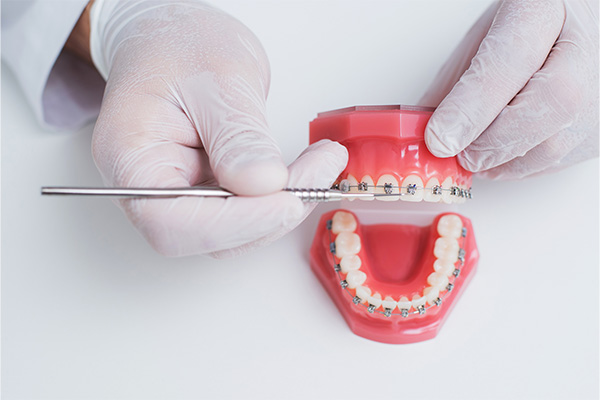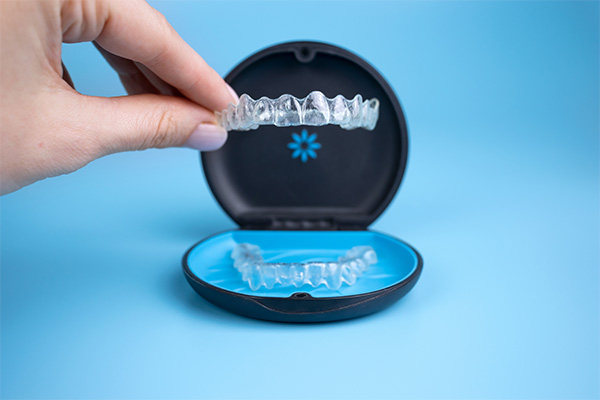Are you thinking about getting braces for yourself or a loved one? Typically, the average age for the start of orthodontic treatment is 8 to 14 years old, but these days more and more adults are wearing braces as they, too, can have the smile they always dreamed of!
A common question orthodontists receive about braces is: do they hurt? While braces can create some discomfort at times, this discomfort overall is very manageable. The discomfort typically only lasts for short periods of time, such as right after a tightening or an adjustment. When you understand that the tightening furthers the progress toward your finish line, it’s easier to tolerate any mild discomfort.
This blog covers:
- Do braces hurt?
- How long will discomfort last after braces are tightened?
- Does Invisalign hurt?
- How can you ease discomfort after an adjustment?
Why Do Braces Hurt?
Braces work by creating pressure on your teeth to move them into the desired position for a better bite and a beautiful smile. The discomfort comes from putting pressure on the bone surrounding the teeth. The bone needs to get out of the way so the teeth can move and this process is a bit uncomfortable.
For starters, know that when your orthodontist is initially placing your braces, you should experience no pain. The braces are bonded to your teeth in a completely painless process. The initial wires are then placed and you’ll feel pressure on your teeth. It usually takes 24-36 hours after the braces are placed or after a braces adjustment before any discomfort is felt.
When you first get your braces on, you will need time to get used to having metal or plastic in your mouth. It is not uncommon to experience some of the following sensations during the first week or so:
- Minor scrapes or sores on the inside of your mouth due to the metal brackets or plastic rubbing against the inside of your cheek
- A feeling of soreness in your gums
- A feeling of slight achiness in your teeth due to the applied pressure
Hang in there! Your month will adapt quickly!


How Long Do Braces Hurt?
After your braces are in place, it should take about a week or so before your cheek tissue adjusts to the new hardware in your mouth and only a few days before you stop feeling the new pressure on your teeth.
Initial Fitting:
When you first get your braces, the fitting process itself isn’t painful. You might feel some pressure as the brackets and wires are being placed, but it’s generally not a painful experience. However, once the braces are on, you might start to feel some discomfort or soreness as your teeth begin to adjust.
First Few Days:
The initial days with braces are usually the most uncomfortable. Your teeth and gums are not used to the pressure, which can cause soreness. It’s similar to the feeling you get after a vigorous workout when your muscles are sore from the new strain.
Regular Adjustments:
After each adjustment, you may experience soreness for a couple of days. This is because your orthodontist tightens the braces, applying new pressure to your teeth to continue their movement.
Overall Duration:
While you might feel some level of discomfort throughout your treatment, it’s usually mild and intermittent. Most people find that the initial and adjustment pains are the only significant discomforts.
Does Invisalign Hurt?
Invisalign has a smooth surface; therefore, many people find it easier on their mouths than the hardware of metal braces. However, some discomfort is to be expected every time a new aligner is placed, as your teeth will need to adjust to the tighter aligner. Typically, each Invisalign aligner is worn for one week and about 20 hours per day.
Invisalign requires fewer appointments than braces and has easier upkeep. These benefits, along with others, make Invisalign attractive for those who are good candidates for aligners. However, Invisalign cannot correct all conditions. More complex corrections may require metal braces. Your orthodontist will determine the best treatment for your needs.


How to Stop Braces Pain
If you are experiencing discomfort after an adjustment or after placing a new aligner, there are many ways to address the discomfort and get relief:
- Eat soft foods after each tightening, such as soups, smoothies, or yogurt
- Take over-the-counter pain relievers (Tylenol, Advil) as recommended by your orthodontist
- Apply topical anesthetic to the gums if the braces or aligners are causing abrasions
- Apply a soft ice pack to your cheek and mouth areas
- Use a warm saltwater rinse (1 teaspoon of salt per 8 ounces of water)
When to Contact Your Orthodontist
If pain persists for more than a few days or is severe, contact your orthodontist. There may be an issue with your braces that needs to be addressed.
The bottom line: it’s normal to expect some discomfort when wearing braces or Invisalign along your path to a beautiful new smile. But in the end, it’s manageable and it’s worth it because you will love your new smile! Straightening teeth not only gives you added confidence in your smile but also better overall dental health.
At Walton & Maready Orthodontics, we understand that getting orthodontic care is an important decision. We are here to answer all of your questions! Contact our office today. We can help you decide what orthodontic treatment might be best for you.

